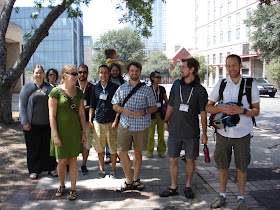Do these people look remotely angry? No!
This is a picture of the Ecological Society of America 2011 tweet-up, which I sort of instigated. Everyone was waiting for someone to do something. So I decided to be that someone! We were going to go back to Koriente, which I’d been to earlier in the week, but they had a line out the door. We went around the corner for barbecue at Stubb’s Bar-B-Q. Barbecue in Austin is a very safe bet, and it was very good.
Contained within the picture are (in no particular order) @bgrassbluecrab, @JacquelynGill, @butterflydoc, @cboettig, @msanclem, a couple of freeloaders, and several fine people whose Twitter handles have escaped me this exact instant (sorry).
Great food, great company. Networking win!
I slid around from session to session today. One morning session, “Invasive species with cross border spread,” made me think, “My institution missed out. We should have had a lot more people at this meeting.” My university sits on the border and has several people concerned with invasions. There are almost certainly other universities in Texas, which also might study species crossing the border between Texas and Mexico. But almost all of the talks in this session were about the Canada-U.S. Border...
I also saw an interesting talk by Steve Ellner of Cornell University (Sarcozona’s star interviewee), who was looking at the effects of rapid evolution in an ecological context. Sometimes, evolution is working very, very hard, to counteract the effects of environmental change – but you wouldn’t necessarily know it, because the environmental change and the evolutionary changes are canceling each other out. In some cases, evolution is actually working in the opposite direction to the observed change, but it just can’t keep up.
Ellner was speaking as part of a symposium on variation within a species. After the last speaker, they had a roundtable with the speakers. I liked this, and wish there were more examples of breaking the standard string of talks.
After the lunch tweet-up, I again wandered from session to session, catching some by the tweet-up crowd. One of the more general ones concerned citizen science. It reviewed papers published to date on citizen science, and compiled some of the challenges and opportunities for citizen science projects.
The benefits of citizen science for scientists is to get more data. For the citizen participants, the main benefit is education. It’s a reciprocal rather than mutual relationship – as citizen science is currently practiced. But because citizen science is so new, it’s worth asking what citizen science could be. There’s a lot of innovative directions in tools for science, and it could create a lot of translational science that citizens can use.
After the poster session, I went back to the T.G.I.Friday’s “batio” to watch the bat emergence for the fourth time. Because watching the bats never gets old. I struck up a conversation with Alina, who I saw in the restaurant with an ESA tote bag. It’s true what they say: “You shall know them by their khaki tote bags...” And we were rewarded with probably the densest pulse of bats I’ve seen so far this week. And this was the night I thought, “Oh, I’ve got plenty of pictures, I won’t bring my camera.” Whoops.
I was also rewarded with T.G.I.Friday’s vanilla bean cheesecake. I think that made my top ten all time dessert list. And I love me some desert, so that’s pretty high praise.
I’m behind, but I still have one more report from ESA to come!
Coverage on other blogs
Local radio station KUT has some interviews from the conference floor, and reporter Lindsay Patterson writes about it on her blog. I like her comment that, “Basically, Austin is everything that’s wrong with the Earth.” (I don’t think she meant it like it sounds.)
The EEB and Flow: ESA Austin: Day 1, Day 2 in Austin, ESA Austin: Day 3, Day 4 (why do conference organizers insist on starting at 8:00 am? Discuss), Day 5 in Austin
Oikos: Sunday and Monday, Tuesday, Wednesday, The ESA meeting should have public lectures, Thursday, The ESA should have science cafes, Friday
R-ecology
blog (and Monday)
A leaf warbler’s gleanings: A few thousand ecologists meet in the city to discuss Earth stewardship... but does anybody know or care? As Ecosystems, Cities Yield Some Surprises - a report on the ULTRA-Ex symposia at ESA 2011; Austin's urban bats pour out into the warm summer night
Biocreativity: Biocreativity at ESA 2011; Ants in my pants; Natural history at ESA 2011; Images for outreach, research and conservation
Culturing Science: The new ecology


No comments:
Post a Comment
Comments are moderated. Real names and pseudonyms are welcome. Anonymous comments are not and will be removed.